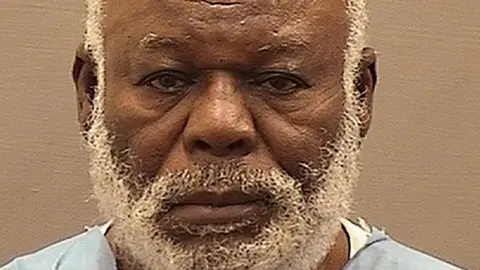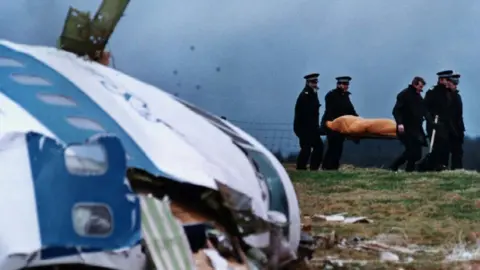Lockerbie bombing suspect will not face death penalty
 Reuters
ReutersA man accused of making the bomb that downed Pan Am flight 103 over Lockerbie, Scotland, 34 years ago was told he would not face the death penalty as he appeared in a US court.
The US alleges that Abu Agila Masud was a Libyan intelligence operative and played a key role in the 1988 attack, which left 270 people dead.
Scottish and US officials announced on Sunday that Mr Masud was in US custody.
He is the first person charged on US soil in connection with the attack.
A device on board the Boeing 747 exploded as the flight was flying over the English-Scottish border, killing 243 passengers, six crew and 11 local residents on the ground - including a family of four.
The dead were citizens of 21 different countries, including 190 Americans and 43 Britons.
It remains the deadliest terrorist incident to have taken place on British soil.
At Monday's hearing, US Magistrate Judge Robin Meriweather elected to delay the formal reading of charges until after Mr Masud secures legal representation for his trial. He did not enter any plea.
He spoke his full name into the record, and was informed by the judge that a translator was present to interpret court proceedings into Arabic for him. He was ordered to remain in custody at least until a detention hearing on 27 December.
Mr Masud is facing multiple charges, including destruction of aircraft resulting in death. Prosecutors said at Monday's hearing that they would not seek the death penalty and Mr Masud could face life imprisonment if convicted.
Wearing a teal prison jumpsuit, he lightly limped into court with a medical mask covering his white beard.
As the judge read out the three charges, he interrupted to say in Arabic: "I can't talk until I've spoken to my attorney."
He is currently seeking legal counsel, which the judge said was his right after Mr Masud rejected the offer of free representation from the public defender's office.
Some of the families of the victims were in court - they told the BBC beforehand they were nervous. They sat silently as the hearing got under way.
Each of the charges he faces include a possible sentence of life in prison, the death penalty or a fine of up to $250,000 (£203,000).
But US prosecutors told the court they would not seek death, as they believe the punishment was not legally available at the time of his alleged crime.
The US justice department first announced criminal charges against Mr Masud in December 2020. At the time, US prosecutors alleged that he had worked for Libyan intelligence in a number of roles between 1973 and 2011, including as an explosives expert.
The case against Mr Masud partly rests on an interview he gave to Libyan officials in 2012 after he was taken into custody following the overthrow of Muammar Gaddafi's government. In the interview, he admitted building the bomb used in the attack and setting its timer to explode while the aircraft was in flight. Mr Masud also claimed that Gaddafi had thanked him and two co-conspirators "for their successful attack" on the US.
A number of observers have voiced concerns that the confession may have been coerced in the chaotic months following the regime's fall, when Libya did not have a fully functioning legal system.
 Reuters
ReutersAt a news conference on Monday, Victoria Cummock - whose husband John died in the bombing - called the US prosecution a "major milestone" for the families of the victims.
She added that the apprehension of Mr Masud was the "first tangible step" by US authorities to hold anyone accountable for the bombing after what she described as a "decades-long miscarriage" of justice.
It remain unclear how Mr Masud came to be in US custody. In late November, it was reported that he had been kidnapped by armed militia members in Tripoli.
In 2001, one of the other co-conspirators identified by US and Scottish officials - Abdelbaset al-Megrahi - was convicted by a Scottish court convened in the Netherlands for his role in the attack. The Scottish government released him on compassionate grounds in 2009, and he died in Libya three years later.
To date, Megrahi - who always maintained his innocence - has been the only person convicted in connection with the attack.
Scotland's Lord Advocate Dorothy Bain, who is the most senior Scottish law officer in the government, said in a statement that she would travel to Washington DC next week to meet prosecutors and attend commemoratives events with victims' families.
In a statement on Monday, she called the US prosecution of Mr Masud a "legal breakthrough", adding that Scottish authorities welcomed the American inquiry.
"The recent developments demonstrate that there can be no time limits placed on the pursuit of justice," Ms Bain said.
With additional reporting from Max Matza and Bernd Debusmann in Washington DC
